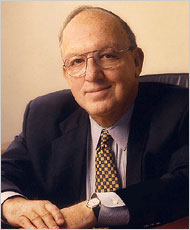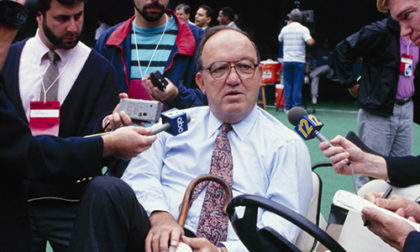Former MLB Commissioner Fay Vincent Talks Sports Betting
He does not likely have any say on the future of sports betting in the United States, but Fay Vincent, the former commissioner of Major League Baseball, still may have some influence. And like other professional sports leaders, Vincent is coming around on the idea of legalized sports betting, even if he isn’t completely gung-ho about it. Vincent spoke with ESPN’s David Purdum last week on the topic and how he sees gambling playing into the future of sports.
Part of Purdum’s interview with Vincent goes back to a brief letter to the editor Vincent wrote to the New York Times in July about how Miami Marlins owner Jeffrey Loria is attempting to sell the team for $1.2 billion, 15 years after buying it for $158 million. In that letter, Vincent wrote:
“For Sale: Team With Few Fans, Sweet Stadium” (front page, July 5), about the effort to sell the Miami Marlins baseball team, doesn’t report the possibility that legal betting on all major sports is not far off. The anticipated flood of revenue to baseball team owners may explain the price being asked, $1.2 billion.
He expanded on that thought with Purdum, saying, “I know that [gambling] is precisely why these prices are going up. I’ve been really astonished and can’t believe, with the amount of money that’s going to flow to sports if gambling is permitted, that it’s not a subject of interest. And no one seems to be paying attention.”

Fay Vincent
Photo credit: New England Collegiate Baseball League
In June, our Haley Hintze reported that the United States Supreme Court agreed to hear New Jersey’s lawsuit against the four major professional sports leagues in the U.S. plus the NCAA. Vincent, as he should, sees this as a huge development and that New Jersey could win, paving the way for the state’s casinos to start offering sports betting.
Currently, Nevada is the only state that has traditional sports betting. In 1992, the Professional and Amateur Sports Protection Act (PASPA) went into effect, making sports betting illegal in the country. States who had legalized sports betting for ten years prior to PASPA were allowed to grandfather in and keep their betting industry, but only Nevada, Montana, Delaware, and Oregon did so, the latter three having forms of sports lotteries, rather than odds-based sports betting.
Vincent himself played an important role in one of the most significant sports-betting related controversies in sports history. In 1989, all-time MLB hits leader Pete Rose was investigated for allegedly betting on baseball games when he was the manager of the Cincinnati Reds in the mid-late 1980’s. In a report, John Dowd detailed that Rose bet extensively on his team while manager. Rose denied it, though over the years, his story changed to never betting on his team to eventually betting on his team, but never against it.
Pete Rose was banned from baseball in mid-1989 and Fay Vincent was the deputy commissioner at the time, significantly involved in the ban agreement. Rose applied for reinstatement in the early-1990’s when Vincent was MLB’s commissioner, but Vincent never acted on the application. Rose remains banned to this day; most people with half a brain believe he bet both on the Reds and against them.
Vincent, naturally, testified for PASPA prior to it becoming law.
“In those days,” he told Purdum, “we were very adamant against betting, because we had just been dealt and were dealing with the Pete Rose case. We saw the risks and the danger of corruption, and we saw that the mafia was involved in some of the things we investigated. It’s dangerous, and it’s still dangerous. But I think the American public wants to bet, and it’s already betting.”
“I’m not a fan of betting, and I’m not minimizing the consequences. The complexities are staggering, but that is such an enormous amount of money, you can see why people would be grasping for it.”
Hundreds of billions of dollars are estimated to be wagered on sports in the U.S. each year, much of it with offshore sports books.
As we have reported in the past, NBA commissioner Adam Silver has been the most prominent sports leader to come out in favor of legalized sports betting. He has spoken on the issue a number of times, including last month. In November 2014, he wrote an op-ed for The New York Times in which he said, in part:
There is an obvious appetite among sports fans for a safe and legal way to wager on professional sporting events. Mainstream media outlets regularly publish sports betting lines and point spreads. Voters in New Jersey overwhelmingly voiced their support for legal sports betting in a 2011 referendum. Gov. Chris Christie of New Jersey recently signed a bill authorizing sports betting at local casinos and horse racetracks, a law the N.B.A. and other leagues have opposed — and a federal court has blocked — because it violates Paspa.
Outside of the United States, sports betting and other forms of gambling are popular, widely legal and subject to regulation. In England, for example, a sports bet can be placed on a smartphone, at a stadium kiosk or even using a television remote control.
This year, both MLB commission Rob Manfred and PGA Tour commissioner Jay Monahan have both said that they have open minds about legalized sports betting and are willing to discuss it.



















COMMENTS